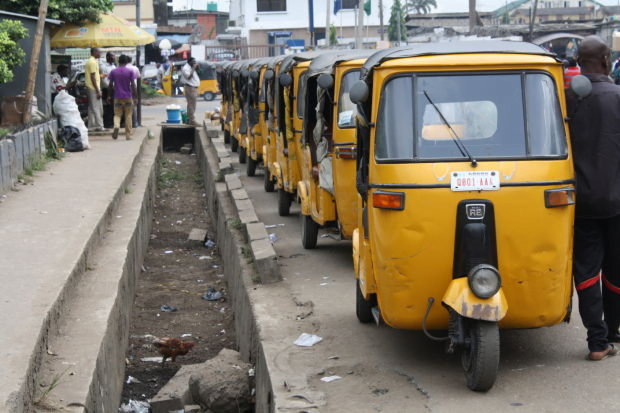Women Breaking Poverty Circle Through Tricycle Business In Ilorin
From NAN
In the bustling streets of Ilorin, where the sun beats down and the drum of life reverberates in every corner, there emerges a trailblazer unlike any other in the town. She is Risikat Adisa, a 54-year-old mother of four with a spirit as fierce as the wind that swept through the city.
Back in 2011, Risikat made a bold decision that would change not only her own life but also set a new path for women in her community. She climbed onto a tricycle, known to all as Keke NAPEP, and ventured into the realm of commercial riding – a domain exclusive to men.
With each turn of the wheel, she becomes not just a driver but a beacon of empowerment and resilience. As she navigates the chaotic streets, her presence became a revelation.
In a conservative Muslim dominated city, Risikat defied stereotypes and expectations. These humble beginnings have grown into a symbol of hope for women seeking to break free from the shackles of poverty.
Risikat became more than a driver, but a model, showing others that gender should never be a barrier to chasing one’s dreams. Popularly known as First Lady among her colleagues, Risikat said she started riding a tricycle when she was 43, to support her husband, a printer, in making provisions for the family.
“I discovered that if you want to succeed as a woman and you want to train your children to the level you want in Nigeria today, you cannot rely alone on your husband’s provision.
“That is what made me have a second thought on what I can do to support my husband and I decided to give riding tricycle a trial,” she said.
In Nigeria, women constitute over 60 per cent of the poorest people; and going by the International Monetary Fund (IMF) statistics, Nigeria has over 87 million people in extreme poverty. This, obviously, translates to approximately 52 million women in the clutches of extreme poverty.
Due to the rising level of poverty among women in Nigeria, the gender referred to as the ‘weaker sex’ have, apparently, decided to take the bull by the horn to do all kinds of jobs, as long as it is legal.
Being the pioneering woman in her field, Risikat operates on the Gaa-Akanbi-Agbabiaka-Danialu route, where she defied odds and persevered with the backing of her husband, in spite of facing disparaging comments from friends and even some family members.
While initially wavering due to external pressure and opinions, Risikat’s husband contemplated halting her tricycle riding venture. However, on recognising the significant contributions she made to the family through the transport business, he chose to support her endeavours.
Commencing her journey with a tricycle acquired through hire purchase, Risikat has since flourished in the business, progressing to the point of purchasing her own tricycle. She has extended her success by entrusting her tricycle to another individual for daily operation, showcasing her evolution from a newcomer to a facilitator of opportunities within the transport sector.
Reflecting on her accomplishments, the female transporter highlights how her four children are now able to attend school with the earnings from her business. In addition to this, she manages a store, selling provisions and beverages, to supplement her income and sustain herself during her 13-year tenure in the tricycle industry.
In spite of the marginalisation and occasional insults from passengers, Risikat remained undaunted. She draws strength from her unwavering focus and determination, emphasising that she refuses to be swayed as she has set her sights on her goals.
She, however, commended her male counterparts for the support given to her as they do not allow any form of intimidation to be her stumbling block. Nonetheless, she noted the prevailing economic downturn was posing a serious challenge as there is little or nothing to go home with after buying fuel and eating.
”Riding of tricycle used to be profitable compared to what is obtainable now. In the first five years that I started, I went home with almost 10,000 Naira daily after my contributions in three different places.
”But now after all deductions, it is difficult to go home with 3,000 Naira which is not encouraging. I now ride tricycle for leisure and as a means of transportation for myself and not strictly for commercial purposes like before,” she said.
Risikat, however, is no longer the only woman in the transport subsector, Mrs Veronica Olawoye, an holder of a National Diploma in Food Technology from the Federal Polytechnic, Offa, also rides tricycle to earn a living.
Sharing a similar sentiment, Veronica said she went into tricycle riding to support her husband when the foodstuff business, she previously engaged in, was no longer profitable.
The 41-year-old mother of two realises she needs not to wait for her husband to receive salary before food is put on the table for the children.
”I do not see it as a shameful act because I do not have to wait for him (her husband) to provide before doing what I need to do for myself and my children.
”Whenever his salary is delayed, we move on as a family as if nothing happened, so my job gives him rest of mind,” said the woman tricycle rider.
For someone that started riding in 2022, just like the ‘First Lady’, she also witnessed stigmatisation especially from the male folks with Ilorin being an Islamic town whose belief lies in the fact that a woman shouldn’t be found in some places.
Veronica had encountered a situation where passengers unboarded from her tricycle on sighting the rider was a woman. A man even went as far as reciting an Arabic phrase of ‘Ahuzubillahi’, meaning I seek refuge from the devil.
She said that the increase in the price of fuel has affected her daily income as she was just holding on to keep body and soul together.
”The removal of fuel subsidy has affected me a lot because I do not work like the men. I take a break to go home and cook and also help my children with their homework.
”Before now, I made between N8,000 and N10,000, but now to make N5,000 is by the Grace of God. We are just hoping that things will change for the better,” she said.
On her part, Mrs Bolanle Aribakun, a secondary school leaver, who abandoned her tailoring for tricycle riding, said she got motivated by other women that have succeeded in the business.
Bolanle started the business two years ago, and has successfully completed payment of the first tricycle she got on hire purchase. She now owns one and currently paying for the second.
”I started this business when I realised where our economy was going, and that it was only one who has fed well that would come to sew clothes.
”I needed to contribute to the upkeep of the family because with two children and my husband as a bricklayer, he cannot do it alone.
”And since I started, things have not remained the same again, it keeps getting better and I know it will be better than it is now,” said the mother of two.
The school cert holder said her male counterparts refer to her as ‘Iron Lady’ because she works like the men from morning until night because she has a target set for herself which must be met.
A passenger, Mr Habeeb Abubakar said he does not care about the gender of a tricycle rider as long as he reaches his destination safely.
He however noted that what he would not do upon sighting a woman as the driver is to sit beside her in the front, as there was no way their bodies won’t touch each other which is against his religious beliefs.
Another passenger, Mrs Aisha Bankole, said she likes to encourage female riders whenever she comes across them and that she over pays them at times, if she is financially buoyant.
She said stigmatising against such women would be like endorsing them to engage in illegal dealings to fend for themselves since the men can no longer do it alone.
Interestingly, Mr Oluwasegun Ogunmoyero, finds love, working with women riders more than the men.
To Ogunmoyero, who is the Chairman, Ogaju Tarmac of Tricycle Owners Association of Nigeria (TOAN) under the Omo Alimi Umbrella, women are less violent than the male counterparts.
He said the women riding in his tarmac are indications that what men can do, women can do better as they pay their higher purchase repayment promptly than the men.
”I have six of them under me here and I have never for once regretted accepting them.
”They are not in any way violent or disobedient and for those that got their tricycle on higher purchase, they pay promptly than some men that we have to threaten them with arrest before they pay up.
”I commend their husbands for allowing them to show their potential and not limiting them,” he said.
The tarmac chairman noted that the present economic situation called for collaboration and support between husbands and wives for survival.





